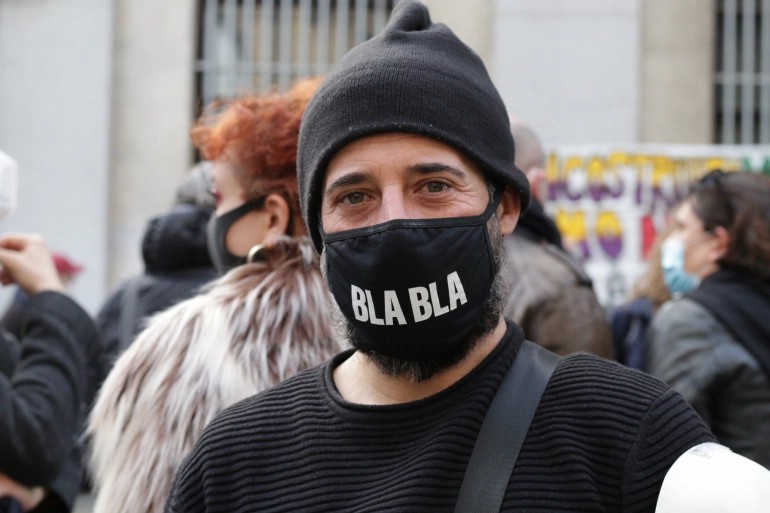Milan, Italy – Art and cultural workers protested across Italy on Tuesday, marking a year since theatres, music venues, cinemas and cultural spaces shut their doors due to the coronavirus pandemic – closures which rendered jobless the 300,000 people working in the sector.
A protest in front of the local seat of the central government in Milan began with a performance in which actors, singers and other stage professionals prepared behind the scenes for a show that never takes place.
“This was a five-minute show that took nine hours to rehearse. We wanted to show what goes into preparations for a production,” Beatrice Parapini, a singer, actress and teacher who took part in the small act, told Al Jazeera.
With cross-regional travel banned since the start of the second wave, a national demonstration took place in 20 regional capitals.
Workers’ unions organised parallel demonstrations in some cities including Rome and Catania.
On Monday night, theatres across Italy switched their lights on to “shine a spotlight on theatre”.
 “We’re calling for the reopening of venues with safety measures, and for more attention to be given to our category, with serious reforms taking into account the atypical nature of work in the cultural sector,” said Parapini, who helped organise the protest.Like others, she has not been eligible for government support in the last year.
“We’re calling for the reopening of venues with safety measures, and for more attention to be given to our category, with serious reforms taking into account the atypical nature of work in the cultural sector,” said Parapini, who helped organise the protest.Like others, she has not been eligible for government support in the last year.
“I had a serious health problem [in 2019], and I fell below the threshold of working days needed to qualify for the grants,” Parapini explains, adding that when the pandemic hit, the projects she had recently resumed had to be put on hold.
Art and culture workers could apply for a 600-euro ($730) grant early in the crisis and four additional 1,000-euro grants announced as the crisis continued.
“But we also need to reopen cultural activities with all due safety measures,” Maurizio Landini, the general secretary of CGIL, one of Italy’s largest trade unions, told journalists in Rome.
“There is also a need for funding and the chance of the European [Next Generation EU] plan is an opportunity for investing in culture and performing arts.”
Across Europe and beyond, cultural venues have been mostly shut as the coronavirus surges, but there have been short periods of reopening, such as in the summer.
In Madrid, the government reopened theatres and cinemas at the end of 2020, despite the country remaining in a state of emergency until at least May 9.
The United Kingdom, which has one of the world’s highest death tolls but is winning praise for its vaccine roll-out, recently announced gradual measures to ease its lockdown. It aims to fully reopen cultural venues by late June.
Exposing structural vulnerabilities
In his first speech, Mario Draghi, Italy’s new prime minister, said: “Culture must be supported. The risk is to lose a heritage that defines our identity. The economic loss is enormous, but the loss of the spirit would be even greater.”
The sector should be supported through investment and the strengthening of protections for workers, he said.
But a year into a crisis that has left many people struggling, protesters are looking for more than words.
A look outside the window of the Montecitorio palace, the seat of the Italian parliament, will remind Draghi, the former ECB president, of the challenges he faces in steering Italy out of the continuing health and economic crisis.

On Monday, restaurant owners protested, calling on the government to reinstate evening opening times.The #iopen movement, launched in January, is vocally supported by the far-right League party leader Matteo Salvini.
Until March 31, employees are protected by a ban on layoffs.
But small business owners, the self-employed and seasonal workers have not been provided such security during the crisis.
Mirko Lanfredini, 42, an actor and artistic director of a small theatre in Milan, says while he was eligible for grants, the theatre school he founded was left reeling.
“Since February 23 last year, my school worked for just a month in June,” Lanfredini said. “Rent is 2,000 euros a month. All our savings are gone.”
“The theatre where I work has 240 seats, and we managed to arrange for it to have 120 distanced seats. But the day we were meant to reopen, the curfew was announced [in October].”
David Ghollasi, a 32-year-old electrician at the Stable Theatre in Rome and protest organiser, called for a “continuity income” for workers on short-term or project-based contracts.
The pandemic has exposed deep-seated problems in the cultural space, including precariousness, widespread informal work and exploitation, said Ghollasi, who added there was one silver lining.
“The pandemic has definitely contributed to breaking down barriers among workers, and a year out of work has given us the time to pause and build movements,” he said.
Francesca Bettio, a professor of political economy at the University of Siena, told Al Jazeera: “We need to rethink the ways we support workers when they’re not in work, our social safety nets.
“For workers in the art sector, the half good news is that they will no longer be treated as separate and marginal. Their problem is becoming more common, and the solutions will have to include them too. The crisis has put us face to face with a paradigm shift we can no longer ignore.”
